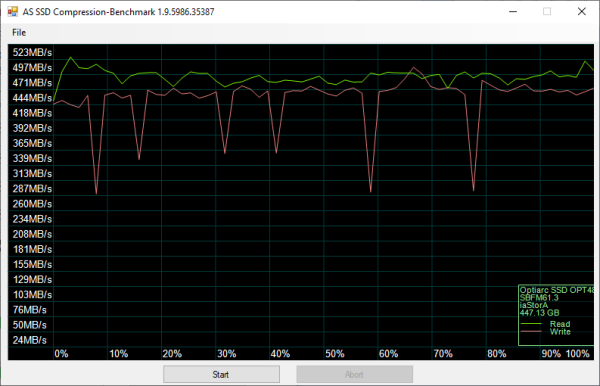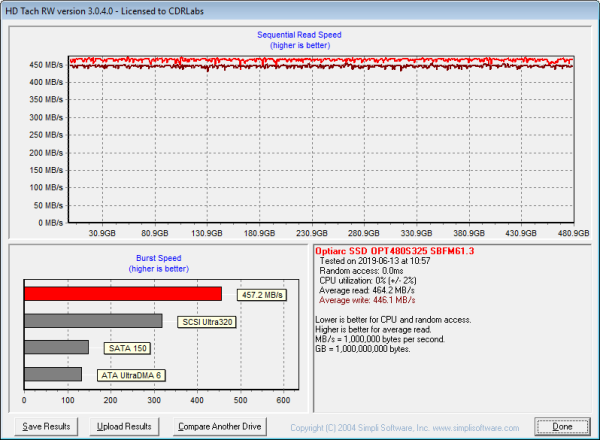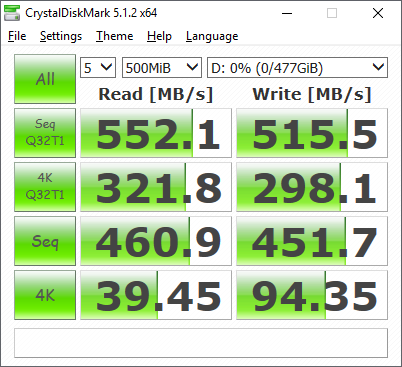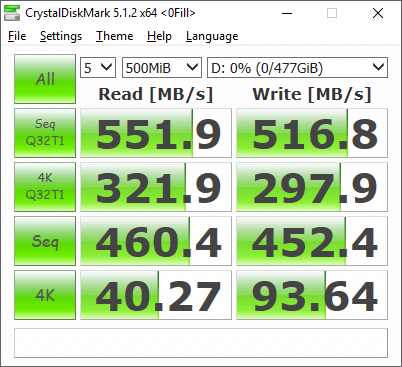The test system used in this review is equipped with an Intel Core i7-6700K CPU, GIGABYTE GA-Z170X-UD3 motherboard, 32GB (16GB x 2) of Crucial Ballistix Sport LT DDR4 memory, Samsung 960 PRO 512GB SSD and a GIGABYTE GeForce GTX 1060 WINDFORCE OC 6G graphics card. For the operating system, I installed a fresh copy of Windows 10 Enterprise.
To test the performance of Optiarc's VP series SSD, I ran a series of benchmarks using CrystalDiskMark, HD Tach RW, ATTO Disk Benchmark, AS SSD, HD Tune Pro, Anvil's Storage Utilities, Iometer and PCMark 8. For comparison, I've also included test results from the ADATA Ultimate SU750, Samsung 860 QVO, Samsung 860 PRO, Crucial MX500, Plextor M8V, Crucial BX300, ADATA Ultimate SU900, Plextor S3C, Toshiba OCZ VX500, ADATA Ultimate SU800, Plextor S2C, Crucial MX300, Plextor M7V, PNY CS1311, OCZ Trion 150, PNY CS2211, Plextor M6V, Crucial BX200, OCZ Trion 100, Kingston HyperX Savage, Crucial MX200, OCZ Vector 180, Kingston BX100, Samsung 850 EVO M.2, Samsung 850 EVO mSATA, AMD Radeon R7, Silicon Power Slim S80, Samsung SSD 850 EVO, OCZ ARC 100, SanDisk Ultra II, Crucial MX100, SanDisk Extreme Pro and Samsung SSD 850 PRO.

As I mentioned earlier, Optiarc's VP series SSD is based on Phison's PS3111-S11 controller chip. Looking at the screenshot above, you can see that it performs equally well with both incompressible (0%) and compressible (100%) data.
CrystalDiskMark 5.1.2:
First, I ran a few quick tests using CrystalDiskMark. This benchmark tool measures the performance of a storage device by testing its sequential read and write speeds as well as its random read and write speeds using blocks 512K and 4K in size.
According to Optiarc, the 480GB version of the VP is capable of reading at 550 MB/s and writing at 490 MB/s. While the drive performed better than expected when reading, it came up a bit short in CrystalDiskMark's sequential write speed test.
Contrary to what we saw with AS SSD's compression benchmark, the VP performed better when using highly compressible 0x00 (0 Fill) data. This time around, the drive was able to read at 562.6 MB/s and write at 543.3 MB/s.
HD Tach RW 3.0.4.0:
Next, I used HD Tach to test the VP's read, write and burst speeds as well as its seek times and CPU usage.

Looking at the screenshot above, you can see that the VP had average read and write speeds of 464.2 MB/s and 446.1 MB/s respectively, as well as a burst speed of 457.2 MB/s.
ATTO Disk Benchmark 2.46:
I also used ATTO Disk Benchmark to test the VP's sequential read and write speeds. The tests are run using blocks ranging in size from 0.5KB to 8192KB and the total length set to 256MB.
When tested with ATTO, the VP's read speeds topped out at about 560 MB/s and its write speeds at 532 MB/s.







